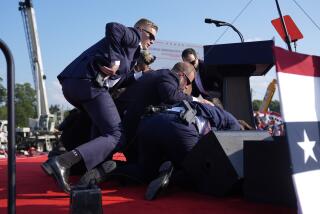U.S. Officials Knew of Embassy Bugging in ’79 : Mistakenly Thought They Could Remove Devices Planted in New Moscow Facility, State Dept. Says
- Share via
WASHINGTON — U.S. officials knew as early as 1979 that the Soviet KGB was systematically bugging the new American embassy under construction in Moscow but failed to use an effective means to stop it, a top State Department official acknowledged Wednesday.
“I think the supervisory people knew that the embassy was being bugged,” Robert E. Lamb, assistant secretary of state for diplomatic security, told a House subcommittee investigating the recent breach of security in Moscow.
Lamb said American officials were unable to combat the bugging because they assumed erroneously that they had an effective “strategy” for removing KGB-planted bugs, and found instead that the eavesdropping capability was an integral part of the Soviet-supplied building materials.
‘Strategy Was Weak’
“Where this strategy was weak was in the sense that the Soviets used parts of the structure itself as the bugging,” Lamb said. “These are the kinds of things that are going to be difficult for us to neutralize.”
As a result of the bugging, the unoccupied embassy building is--in the words of Rep. Connie Mack (R-Fla.)--”an eight-story microphone plugged into the Politburo.” A commission headed by former Defense Secretary James R. Schlesinger is looking into whether the $23-million building should be demolished and replaced to eliminate the bugs.
Espionage charges filed recently against two Marine guards who served at the current U.S. Embassy, who allegedly were compromised by sexual affairs with Soviet women, have focused attention on security breaches at the construction of the new U.S. Embassy building in Moscow.
The building is part of a $190-million complex that is being built under terms of an agreement negotiated between the United States and the Soviet Union in 1972. The agreement called for the Soviets to provide large prefabricated parts of the building, which were viewed as cheaper than more secure types of construction.
“Security was not considered seriously enough in the construction from the earliest stages,” Lamb acknowledged. “Security factors took a back seat to costs.”
Rep. Doug Bereuter (R-Neb.) said that because of the bugs, the building can never be used by U.S. officials to discuss secret information. He suggested that instead of tearing down the building, the United States should construct an annex to house activities that officials want to keep secret from the Soviets.
Lamb replied that the idea of an annex is one of several possibilities being considered. Subcommittee members said the U.S. government is also considering replacing the top two floors of the building, but they speculated that that would be as expensive as building an entirely new one.
Bereuter, who was trained in military counterintelligence, said U.S. officials simply underestimated the sophistication of Soviet electronic eavesdropping technology.
‘Old Technology’
“It’s not a matter of debugging rooms--that’s old technology,” he said. “The problem is bigger than that.”
Members of the subcommittee harshly criticized State Department officials for bungling security in Moscow, both at the existing embassy as well as at the new one. Rep. Chester G. Atkins (D-Mass.) called them “a collection of apologists” and Rep. Larry Smith (D-Fla.) accused them of “gross negligence, gross ineptitude, gross stupidity.”
Smith noted that until recently the United States had allowed foreign engineers and construction firms without U.S. security clearances to work on construction of overseas missions. “So the Soviets could have the blueprints for everything that was being built for the United States overseas for the last 10 years?” he asked.
“Yes, sir,” replied Lamb, “that’s a possibility.”
U.S. Pensions for KGB
Rep. Olympia J. Snowe (R-Me.) noted that the United States is still paying benefits to Soviet citizens who have previously worked at the embassy, at least some of whom are presumed to have been employees of the KGB. “So conceivably,” she said, “we’re paying retirement benefits to KGB agents.”
Subcommittee Chairman Daniel A. Mica (D-Fla.), who visited the existing U.S. Embassy in Moscow recently along with Snowe, said the two lawmakers found so much hostility between the Marine guards and U.S. diplomats that one Marine told them he did not know whether he would protect the Americans if the building were under attack.
Mica said they also found that people entering the U.S. Embassy between 9 a.m. and 5 p.m. were examined for guns and explosives but that no such search was required for visitors entering at other times of the day--even though traffic through the building was always “like a subway station.”
Improved Security
Lamb insisted that U.S. concern for security at the embassies in Moscow and elsewhere has improved in the last two years, largely because of legislation passed by Congress. Among other things, he said, the United States will soon have a civilian guard force with security clearances at all embassy construction sites.
U.S. officials have also filed a multimillion-dollar claim against the Soviet Union over construction problems connected with the new U.S. Embassy in Moscow and they are considering expanding the claim to include complaints against the Soviet-planted bugging system. The claims will be heard by a panel of three arbitrators in Stockholm.
But Lamb and other State Department officials did not reply when Smith declared: “We have a totally unusable embassy. Will you ask them for $200 million?”
President Reagan has decreed that the Soviets cannot fully occupy their new embassy compound in Washington until complaints about the U.S. building in Moscow are resolved.
More to Read
Sign up for Essential California
The most important California stories and recommendations in your inbox every morning.
You may occasionally receive promotional content from the Los Angeles Times.










